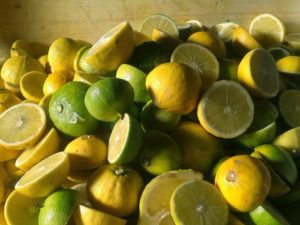 Bergamot, the typical citrus of Calabria, can be considered the Italian answer to American superfoods, thanks to about 350 polyphenols that are found in high concentration in it and have antioxidant, anti-inflammatory, and vasoprotective properties. Two polyphenols, in particular, are very effective to control cholesterol, to the point that they are considered as real natural ‘statin’. They are two compounds identified in the fresh juice of bergamot (but also present in both skin and white part of the fruit) that act on cholesterol synthesis, reducing its levels in the blood. These benefits are added to the positive effect of reducing blood glucose and activating some organic antioxidants. So, beginning one’s breakfast with a bergamot juice seems a good idea not only because it is not necessary to worry about cholesterol, but also to keep fit and healthy. In addition, it is also natural and easy to accomplish habit, since fresh bergamot for some time has arrived in supermarkets and in the grocery stores, thanks to the farmers of Unionberg consortium and ‘Citrus l’Orto Italiano’ brand.
Bergamot, the typical citrus of Calabria, can be considered the Italian answer to American superfoods, thanks to about 350 polyphenols that are found in high concentration in it and have antioxidant, anti-inflammatory, and vasoprotective properties. Two polyphenols, in particular, are very effective to control cholesterol, to the point that they are considered as real natural ‘statin’. They are two compounds identified in the fresh juice of bergamot (but also present in both skin and white part of the fruit) that act on cholesterol synthesis, reducing its levels in the blood. These benefits are added to the positive effect of reducing blood glucose and activating some organic antioxidants. So, beginning one’s breakfast with a bergamot juice seems a good idea not only because it is not necessary to worry about cholesterol, but also to keep fit and healthy. In addition, it is also natural and easy to accomplish habit, since fresh bergamot for some time has arrived in supermarkets and in the grocery stores, thanks to the farmers of Unionberg consortium and ‘Citrus l’Orto Italiano’ brand.
Bergamot is excellence of Calabria. Its production is concentrated in this area and from here the essential oil of bergamot arrives. Its cultivation covers 1,500 hectares of alluvial and calcareous clay soils, where 20,000 tonnes of fruit are obtained every year on average. From their outer part about 100,000 kg of essential oil are obtained, for which the ‘noses’ of the whole world are looking, and which are insufficient compared to the demand, as it enters the bouquet of over 300 famous brand perfumes. In the food sector, too, bergamot is increasingly requested: its pulp is used in patisserie and to prepare infusions, teas, and soft drinks.
Fresh bergamot is commercially available from October to March. It is small, round, yellow-green as a lemon, has sour and bitter pulp, very fragrant and refined. The ideal way to taste it is to eat it in a salad, seasoned with mild olive oil. But in cuisine bergamot is especially used squeezed on salads, in teas and infusions, and as a substitute for oranges or lemons in meat recipes, from duck to scallops. With its intense, citrusy aroma it is perfect to temper the recipes with too strong flavours, such as pie with anchovies cooked au gratin and sardines, or to dampen the wild flavour of boar, hare, or pigeon meat. A perfect match is with such clearly sweet foods as crustaceans, from lobster to shrimp.
If the consumers prefer to drink it, its juice can be drunk natural, simply diluted with a little water, or sweetened with a teaspoon of honey. Or it can be mixed with orange juice, to get super strengthener and detox drink, rich in vitamins C, B1, and B2.
